KUNAR PROVINCE, Afghanistan - It does not take long for the kids to show up.
When Afghan and International Security Assistance Forces set foot in a community in eastern Afghanistan, they become objects of fascination to question, shake hands with and watch.
"They'll ask us why we're here," said U.S. Army Spc. Cory B. Petrosky of Grapevine, Texas, a radio operator with Company A, 1st Battalion, 327th Infantry Regiment, Task Force Bulldog. "They'll talk about their daily lives ... They like to let us know what they're doing. They'll show us their school books."
Many of the youths ask for the pens U.S. Soldiers keep in their uniform sleeves while others want to say hello and show off their English skills. Troops can quickly find themselves surrounded by a crowd of smiling children.
U.S. Army Capt. Robert R. Reynolds of Huntsville, Ala., the company commander of the unit based at Combat Outpost Honaker-Miracle in Kunar province, said the more contact his Soldiers have had with a village, the friendlier the residents are and the more cooperation they provide.
"I think we're very respectful to the people," he said. "They always want to ask us in for tea, and the kids always go up to the Soldiers and want to give them high-fives."
Reynolds, whose base sits where the Watapur and Pech Valleys meet, said their most recent focus with residents has been crop diversification. This program involves the Afghan government paying farmers to keep roadside cornfields at a certain height and thereby denying insurgents a place from which they can ambush traffic.
"We're getting out there and working with the locals ... and showing them we're here to secure the area for everyone," Reynolds said.
Building rapport with the Afghan people can be accomplished in many ways.
Provincial reconstruction, agribusiness development and civil affairs teams across the country serve as a conduit between the people and their government to ensure the progress of public works projects.
Reaching out
At Combat Outpost Najil in Laghman province, the civil affairs team does its work through daily meetings with area residents - whether in their homes, at community gathering places or on the hillside base itself.
U.S. Army Staff Sgt. Joshua E. Barton of Ridgefield, Conn., with Company B, 1st Battalion, 102nd Infantry Regiment, Task Force Iron Gray, said establishing trust with the Afghans can be a long process.
"If they don't trust you, they won't believe you," Barton said. "They won't work with you."
Barton, who serves as the lead noncommissioned officer for the COP Najil civil affairs team, said they build respect through everyday interactions - getting to know the residents and letting the Afghans get to know them. He said his main goal is to mentor the Afghans and help them help themselves.
When the team makes repeated visits to villages, the residents become accustomed to their presence, Barton said.
"The next time I go, I'm not a stranger anymore," he said.
Gaining the confidence and support of the people is essential to the mission, he noted. Demonstrating they can believe what he says is a crucial part of it. Recently, he sponsored a pre-Ramadan dinner for locals to demonstrate his respect for their culture.
"In order to get close to people, you have to build a relationship with them," Barton said. "You have to get out every single day."
In some cases, relationships can be built without ever seeing the person. One successful ISAF program is the sponsoring of Afghan-managed radio stations.
At COP Honaker-Miracle, the station is "The Voice of the Waterpur," at 91.5 FM where music, advice shows and Islamic programming serve as a rallying point to bring Afghan communities from throughout the area together, U.S. Army Capt. Adam R. Alexander of Mount Airy, Md., the base executive officer, said.
The station has attracted such an audience that it receives about 200 letters a week, ranging from fan letters to song requests. It has featured informative interviews with local public figures such as the director of the District Development Authority and the Afghan National Army commander from nearby Combat Outpost Able Main.
Most importantly, the station is run and programmed by local Afghans - not the Americans.
"We don't use it as a propaganda tool," Alexander said. "It's really popular ... it's an entertaining radio station. People are well-aware of it around here."
The station also provides an alternative to a nearby insurgent radio station that encourages attacks against Afghan and ISAF troops. "Voice of the Waterpur" Manager Rasol Mohammad said despite insurgent threats against his broadcasters, the local population regularly expresses its appreciation of the work they do and the message they send.
"They like us," Mohammad said. "They respect us because we work at the radio station. It's a service for my country."
Being prepared
Service is also a focus at Forward Operating Base Finley-Shields in the Nangarhar province, where an Afghan scouting program has steadily built momentum.
The program, which currently involves service members and base personnel working with Afghan children, was recently awarded a $100,000 grant by the U.S. Department of State. U.S. Army Capt. Glenn T. Battschinger of Mays Landing, N.J., a civil affairs team commander with the 404th Civil Affairs Battalion, Task Force Spartan, began the program in February.
As a Boy Scout troop leader and former Eagle Scout, Battschinger said he wanted a way to provide Afghan youth with the attention they need and to help teach them discipline and respect.
"I'm teaching these kids the way I teach my Scouts at home," he said. "They're the same children."
With the support of local Afghan leaders, about 100 boys have joined the troop and meet weekly in a secure field at the base, learning such skills as knot-tying and first aid.
"It takes an hour a week and that's more joy than we get from the rest of the week," Battschinger said of those at the base who volunteer to help at the meetings.
One of those volunteers was U.S. Army Capt. Mary B. Danner-Jones of Neenah, Wis., the public affairs officer for the Nangarhar Provincial Reconstruction Team. Her unit's executive officer, U.S. Army Maj. Jocelyn Leventhal, asked her to take charge of a girl's scouting program that would mirror the boys'. In August, they had their first meeting in a separate part of the field.
Plans call for the girls to learn crafts, hygiene and first aid. Danner-Jones said she hopes the girls' program "opens up the world for them and gives them a view outside of their compound."
The Afghan Scouts program is currently not affiliated with the World Organization of the Scout Movement, although it uses many of the same traditions. In April, Boy Scouts from the United States sent the Afghans neckerchiefs they could wear to make up for their lack of uniforms.
Uniforms won't be a problem much longer with the State Department grant, which will fund Afghan Scout troops at 30 schools throughout the Jalalabad area for a year, Battschinger said. It will cover the costs of two troops at each school - one male and one female - in addition to uniforms and instructors.
"All those Afghan children need is a bit of attention," he said, noting the future leaders of the country are children. "This is something that will touch everyone that comes in contact with it."
Faridoon Malikzai, a senior patrol leader interviewed in April, said the program had encouraged the kids to go to school, stay honest and stay out of trouble. He hoped to someday work as a professional scout leader.
"I'll train the people to do good works," Malikzai said. "The future of the country belongs to the kids. They will know what is right and what is wrong."
Trust during wartime
U.S. Army Capt. Dakota Steedsman of Harvey, N.D., company commander of Company D, 1st Bn., 327th Inf. Reg., at Combat Outpost Michigan, has been working with local leaders on both crop diversification and the rebuilding of the main road through the Pech Valley.
The road suffered washouts during the heavy rains of July. While the damage impacts military patrols, it also hurts residents, since they have to use the road for transportation and commerce, he noted.
"That's the main way for the people to get their products to market," Steedsman said.
One recent success working with community leaders is the village of Shamun, which hasn't been visited by officials in years locals said. His unit made contact with the village in July and is discussing potential development projects with its elders.
"It's all been positive," Steedsman said. "They're happy to have us there."
Afghan personnel can make a difference in these meetings. During the unit's first visit to Shamun, an Afghan Army lieutenant encouraged village elders to participate in crop diversification, making the case and discussing the issues without the need of a translator.
"It definitely helps when we go to these things," Steedsman said.
Petrosky said the reaction village children have to himself and his fellow Soldiers is a good way to tell how a community feels about them. Some children at villages unused to them, hang back, scared of their presence.
Once the people become comfortable with them, the children move in with their questions and requests.
Before he came to Afghanistan, Petrosky was not expecting the populace to be friendly at all. He thought they would be hostile, and it makes an impact when he and other Soldiers get the opposite reaction.
"It makes me feel like we're here for a reason," the specialist said. "It makes you feel pretty good ... It makes us feel like we're making a difference here."
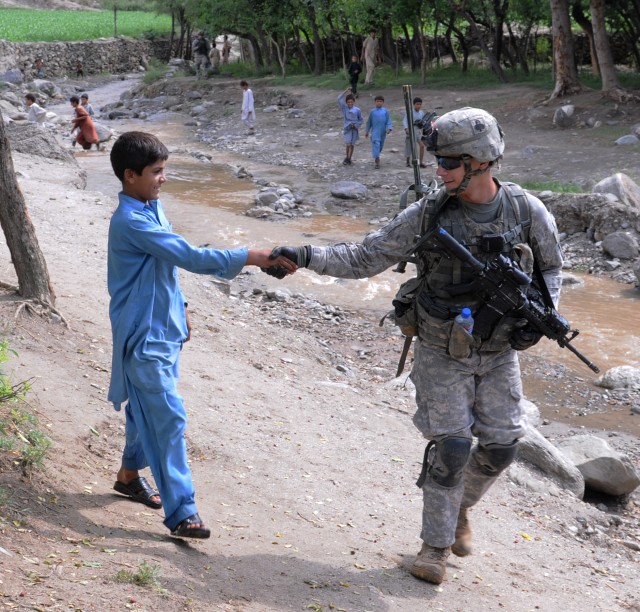
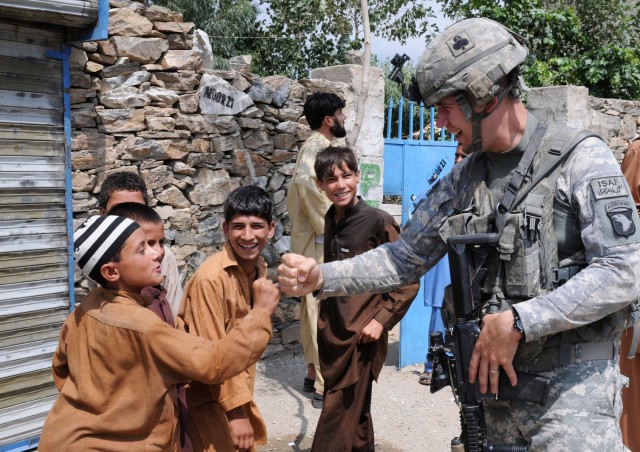
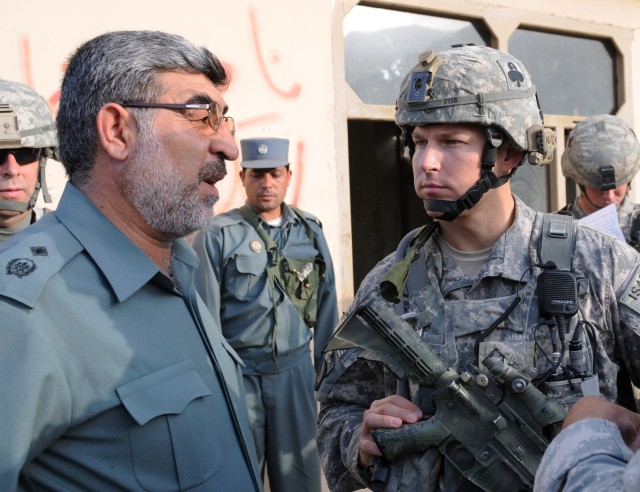
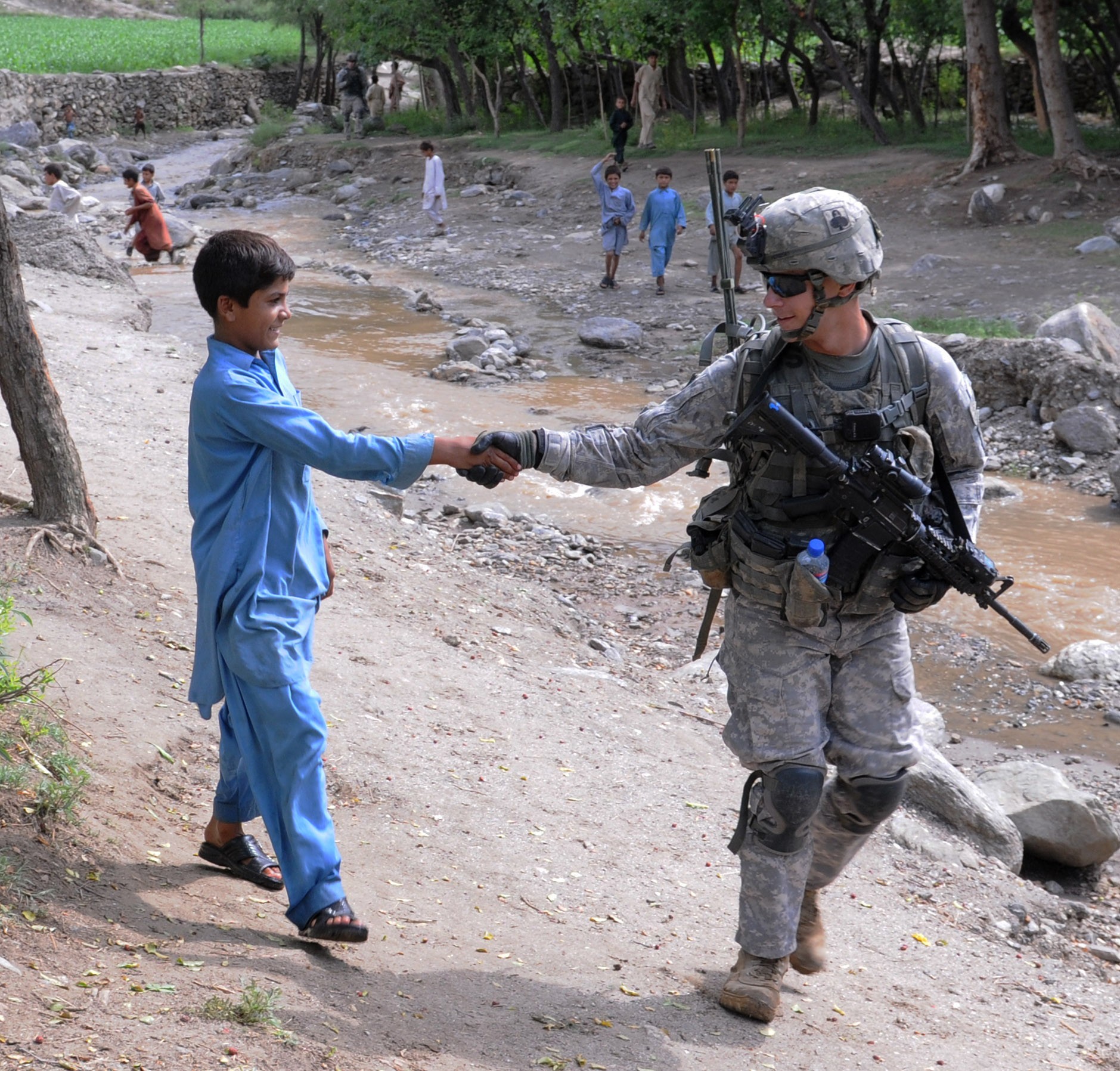
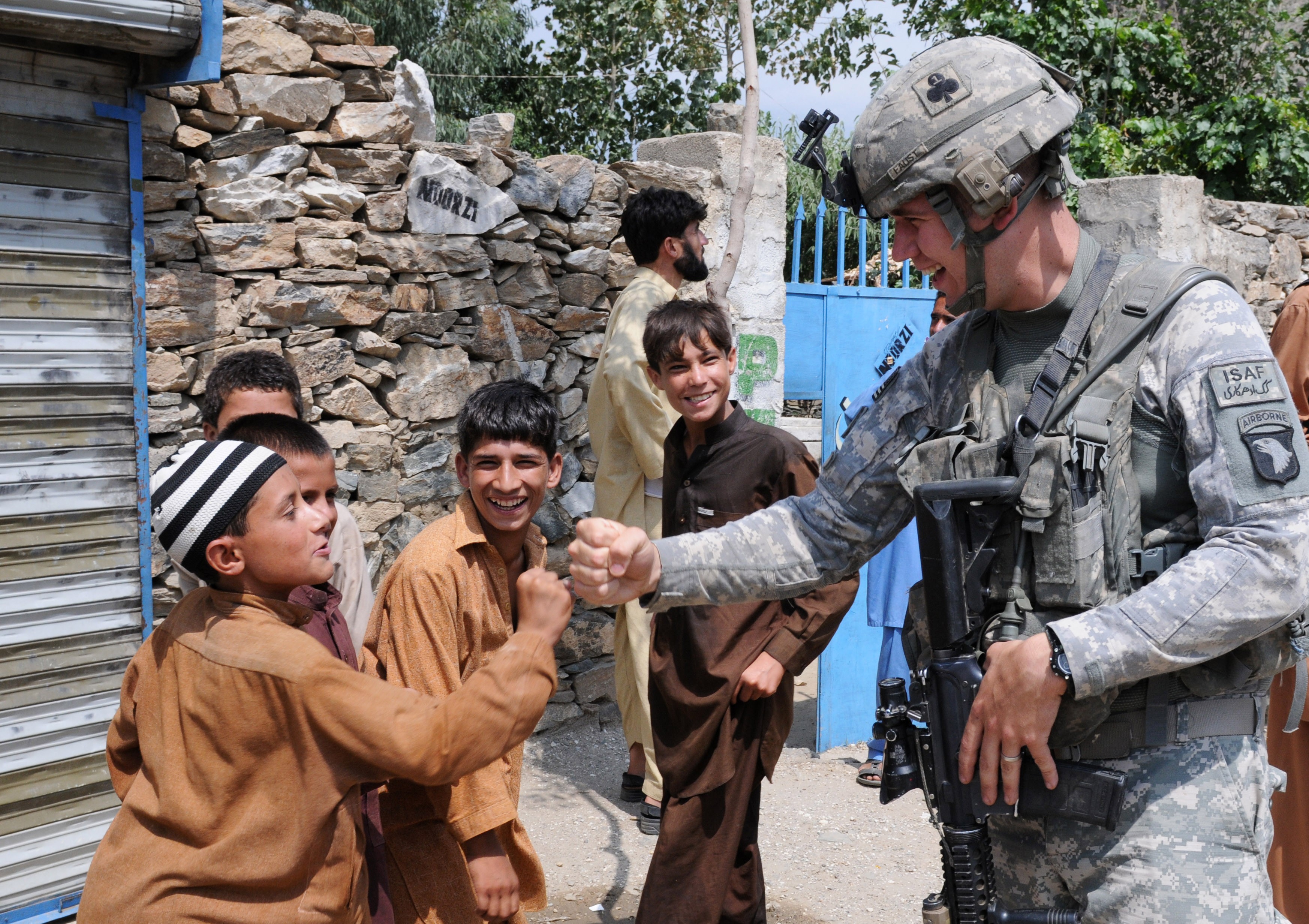
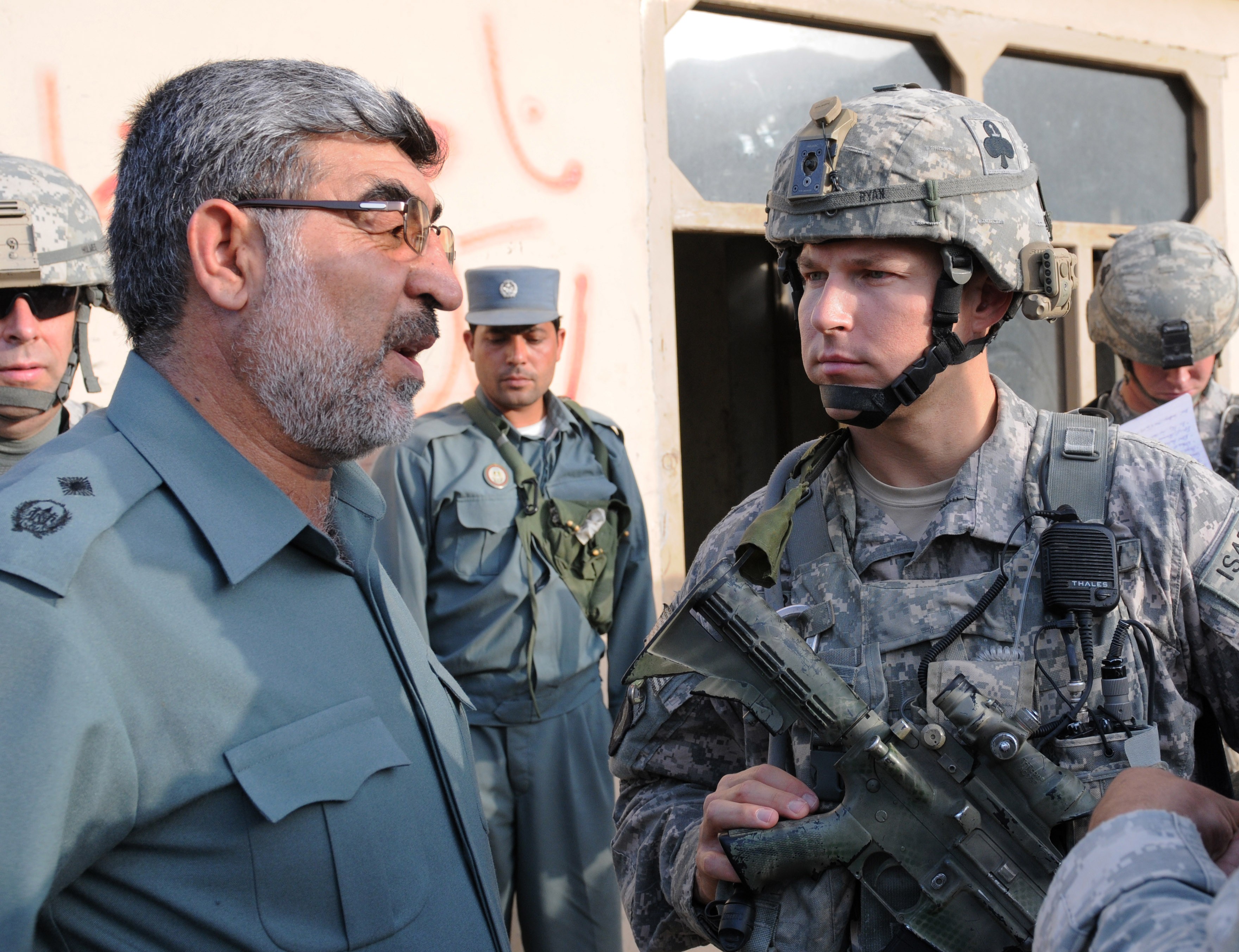
Social Sharing